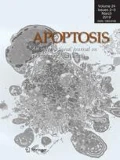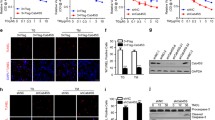Abstract
Caspase-12 is activated when the cells are exposed to excess levels of various stimuli, which cause endoplasmic reticulum (ER) stress. Protein kinase C (PKC) plays an important role in many signaling pathways in cells, and the activation of PKC has multiple actions in the signaling function of the ER. This study examined whether or not phorbol 12, 13-dibutyrate (PDBu)-induced PKC activation modulates caspase-12 cleavage and it’s processing, using a wild type caspase-12 overexpressing neuronal cell line, known as Cas-12 cells. The thapsigargin treatment induced caspase-12 fragmentation in the Cas-12 cells. This was inhibited by PKC, which had previously been stimulated by PDBu. The PDBu treatment attenuated the ER stress-induced translocation of caspase-12 from the ER to the cytoplasm. The caspase-3 specific inhibitor blocked caspase-12 fragmentation, and purified caspase-12 was cleaved by the active caspase-3 in vitro, suggesting thatcaspase-12 might be a substrate for caspase-3. In addition, the PDBu treatment influenced the decrease of active caspase-3 fragment. These results suggest that an ER stress induces the activation of caspase-12 via caspase-3, and that PKC regulates both caspase-12 and caspase-3 activations in Cas-12 cells
Similar content being viewed by others
References
Salvesen GS, Dixit VM. Caspases: Intracellular signaling by proteolysis. Cell 1997; 91: 443–446
Thornberry NA, Lazebnik Y. Caspases: Enemies within. Science 1998; 281: 1312–1316
Zheng TS, Flavell RA. Apoptosis. All’s well that ends dead. Nature 1999; 400: 410–411
Van de Craen M, Vandenabeele P, Declercq W, et al. Characterization of seven murine caspase family members. FEBS Lett 1997; 403: 61–69
Hu S, Snipas SJ, Vincenz C, et al. Caspase-14 is a novel developmentally regulated protease. J Biol Chem 1998; 273: 29648–29653
Nakagawa T, Zhu H, Morishima N, et al. Caspase-12 mediates endoplasmic-reticulum-specific apoptosis and cytotoxicity by amyloid-beta. Nature 2000; 403: 98–103
Nakagawa T, Yuan J. Cross-talk between two cystein protease families. Activation of caspase-12 by calpain in apoptosis. J Cell Biol 2000; 150: 887–894
Gervais FG, Xu D, Robertson GS, et al. Involvement of caspases in proteolytic cleavage of Alzheimer’s amyloid- beta precursor protein and amyloidogenic A beta peptide formation. Cell 1999; 97: 395–406
Wootz H, Hansson I, Korhonen L, et al. Caspase-12 cleavage and increased oxidative stress during motor neuron degeneration in transgenic mouse model of ALS. Biochem Biophys Res Commun 2004; 322(1): 281–286
Bitko V, Barik S. An endoplasmic reticulum-specific stress-activated caspase (caspase-12) is implicated in the apoptosis of A549 epithelial cells by respiratory syncytial virus. J Cell Biochem 2001; 80: 441–454
Rao RV, Hermel E, Castro-Obregon S, et al. Coupling endoplasmic reticulum stress to the cell death program. Mechanism of caspase activation. J Biol Chem 2001; 276: 33869–33874
Gómez-Angelats M, Bortner CD, Cidlowski JA. Protein kinase C (PKC) inhibits Fas receptor-induced apoptosis through modulation of the loss of K+ and cell shrinkage. A role for PKC upstream of caspases. J Biol Chem 2000; 275: 19609–19619
Gómez-Angelats M, Cidlowski JA. Protein kinase C regulates FADD recruitment and death-inducing signaling complex formation in Fas/CD95-induced apoptosis. J Biol Chem 2001; 276: 44944–44952
Stennicke HR, Deveraux QL, Humke EW, et al. Caspase-9 can be activated without proteolytic processing. J Biol Chem 1999; 274: 8359–8362
Xia Z, Kam CM, Huang C, et al. Expression and purification of enzymatically active recombinant granzyme B in a baculovirus system. Biochem Biophys Res Commun 1998; 243: 384–389
Liu X, Zou H, Widlak P, Garrard W, Wang X. Activation of the apoptotic endonuclease DFF40 (caspase-activated DNase or nuclease). Oligomerization and direct interaction with histone H1. J Biol Chem 1999; 274: 13836–13840
Pedrosa Ribeiro CM, McKay RR, Hosoki E, et al. Effects of elevated cytoplasmic calcium and protein kinase C on endoplasmic reticulum structure and function in HEK293 cells. Cell Calcium 2000; 27: 175–85
Cryns V, Yuan J. Proteases to die for. Genes Dev 1998; 12: 1551–1570
Fernandes-Alnemri T, Takahashi A, Armstrong R, et al. Mch3, a novel human apoptotic cystein protease highly related to CPP32. Cancer Res 1995; 55: 6045–52
Welihinda AA, Tirasophon W, Kaufman RJ. The cellular response to protein misfolding in the endoplasmic reticulum. Gene Expr 1999; 7: 293–300
Tan Y, Ruan H, Demeter MR, Comb MJ. p90 (RSK) blocks bad-mediated cell death via a protein kinase C-dependent pathway. J Biol Chem 1999; 274: 34859–34867
Whitman SP, Civoli F, Daniel LW. Protein kinase CbetaII activation by 1-beta-D-arabinofuranosylcytosine is antagonistic to stimulation of apoptosis and Bcl-2alpha down-regulation. J Biol Chem 1997; 272: 23481–23484
Mizuno K, Noda K, Araki T, et al. The proteolytic cleavage of protein kinase C isotypes, which generates kinase and regulatory fragments, correlates with Fas-mediated and 12-O-tetradecanoyl-phorbol-13-acetate-induced apoptosis. Eur J Biochem 1997; 250: 7–18
Ruiz-Ruiz MC, Izquierdo M, de Murcia G, Lopez-Rivas A. Activation of protein kinase C attenuates early signals in Fas-mediated apoptosis. Eur J Immunol 1997; 27: 1442–1450
Zhuang S, Demirs JT, Kochevar IE. Protein kinase C inhibits singlet oxygen-induced apoptosis by decreasing caspase-8 activation. Oncogene 2001; 20: 6764–6776
Nicholson DW, Thornberry NA. Caspases: killer proteases. Trends Biochem Sci 1997; 22: 299–306
Jayanthi S, Deng X, Noailles PA, et al. Methamphetamine induces neuronal apoptosis via cross-talks between endoplasmic reticulum and mitochondria-dependent death cascades. FASEB J 2004; 18(2): 238–51
Hitomi J, Katayama T, Taniguchi M, et al. Apoptosis induced by endoplasmic reticulum stress depends on activation of caspase-3 via caspase-12. Neurosci Lett 2004; 357(2): 127–130
Author information
Authors and Affiliations
Corresponding author
Rights and permissions
About this article
Cite this article
Lee, W., Kim, D.H., Boo, J.H. et al. ER stress-induced caspase-12 activation is inhibited by PKC in neuronal cells. Apoptosis 10, 407–415 (2005). https://doi.org/10.1007/s10495-005-0814-6
Issue Date:
DOI: https://doi.org/10.1007/s10495-005-0814-6




